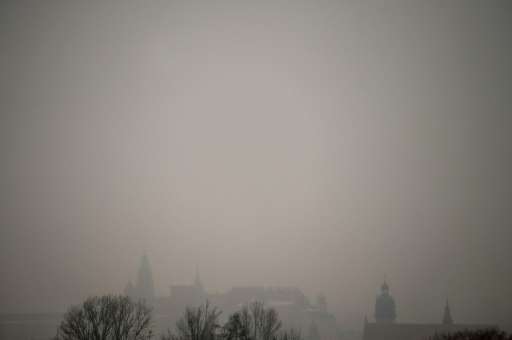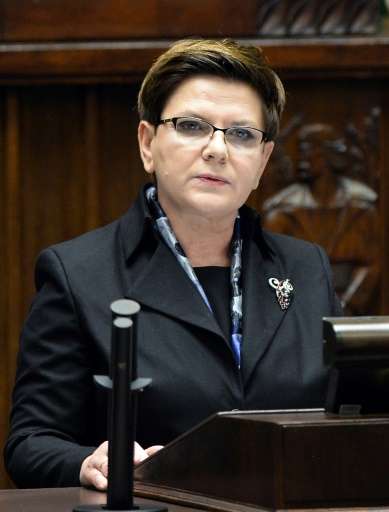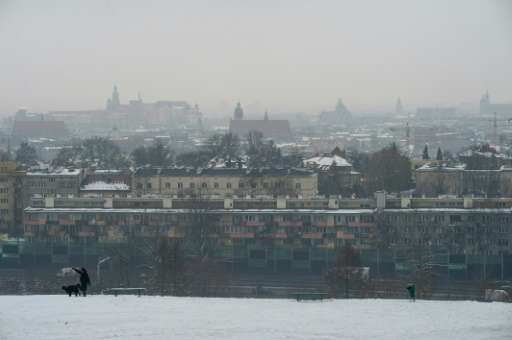Poland's coal addiction exacts heavy health, economic toll

The thick, grey layer of smog blanketing Poland's southern city of Krakow is one of the most visible symptoms of the EU member's addiction to coal, a habit experts warn is both economically risky and deadly.
"Just over 47,000 Poles are estimated to die prematurely each year from smog caused mostly by low quality coal burned in old-fashioned household furnaces," Andrzej Gula, head of Poland's Smog Alarm group, told AFP quoting a European Environment Agency (EEA) study published Monday.
Seventy percent of Polish households use coal for heat and antiquated coal-fired power plants generate nearly all the country's electricity, giving it some of the dirtiest air in the 28-member European Union.
The EEA blames this so-called "low-stack" or household emissions for countless cases of respiratory illness in the country of 38 million people.
While new right-wing President Andrzej Duda recently approved anti-smog legislation allowing municipalities to ban coal-fired home furnaces, he also refused to endorse an amendment to the UN's Kyoto carbon-cutting pact requiring Poland to curb greenhouse gas emissions that equal around one percent of the global total.
Prime Minister Beata Szydlo, who is the daughter of a coal miner and a Duda ally, has vowed to keep domestic coal as Poland's "main energy source to guarantee energy security" and economic growth.
Speaking in Paris at landmark UN climate talks, Szydlo said Monday that Poland would endorse any deal "that protects Polish economic interests", signalling that her new right-wing government intends to drive a hard bargain on coal use within the EU.
Vestige of communism
But far from speeding growth, experts argue that coal dependence rooted in the communist era risks derailing a quarter of a century of spectacular free-market expansion.
Rock-bottom global coal prices are driving inefficient Polish mines to bankruptcy, threatening 100,000 heavily subsidised—and politicised—mining jobs.
Subsidies worth around 70 billion zloty (16.3 billion euros, $17.4 billion) were pumped into Polish mines between 1990-2012, according to the Warsaw-based WISE economic think tank.
"Poland can't afford to keep subsidising coal to preserve jobs and mines—it's uncompetitive and against EU rules," insisted Grzegorz Wisniewski, head of the Institute for Renewable Energy, another Warsaw-based think tank.

And cheap green energy on the European grid could soon render Poland's communist-era coal-fired electricity plants uncompetitive, he warned, evoking the EU's 2020 target for 20 percent green energy in its mix.
A coal-based energy sector, protected by the state, "can survive until 2020, but just after that or even sooner Poland will be in big trouble," Wisniewski said.
Because of cheaper foreign coal Poland's "energy sector will no longer be competitive and the economy will have to cope with higher heating and electricity costs.
"To develop after 2020, Poland will have to import cheap electricity from renewable sources from elsewhere on the European grid."
A model developed by his institute shows Poland can "achieve a 28 percent share of renewables in the overall national energy mix by 2030".
The plan taps sunshine and wind to "reduce carbon dioxide emission by 40 percent relative to 1990 levels, without great costs compared to the official coal-driven scenario," he said.
Venture capitalists focused on renewables warn that slow implementation of a newly adopted renewables law may delay addition of new production capacity.
But Michal Ruminski, head of Warsaw-based EEC Ventures, is optimistic that renewables—mostly wind— "could make up 17-18 percent" of Poland's electricity mix within five years.
Poland must boost its overall use of renewable energy to at least 15 percent by 2020 under EU deals on emissions curbs, and it is not clear how Warsaw intends plans to meet the target.
Green dreams

While the central government is sticking to coal for the moment, local authorities are helping Poles go green.
On the outskirts of Krakow, the town of Golcza is turning to the sun to fight smog and save money.
Two years ago Mayor Leslaw Blacha secured 370,000 euros (397,000 dollars) in EU funding to cover 90 percent of the costs of fitting 20 percent of the town's 1,600 households with solar panels to heat water.
The programme has been a whopping success, both in terms of improved air quality and savings on heating.
"Now residents want photovoltaic panels, so I'm looking for more EU funds to get it done," he told AFP.
Local farmer Andrzej Dziubka used the EU funds to install three solar panels to heat water for his family of five.
"I get solar power for free from nature and use about 40 percent less coal now," the 38-year-old told AFP.
Dziubka is so happy with the results, he wants to install a small wind turbine and more solar panels to generate electricity for his home.
But even if he'll eventually end up saving money, the up-front investment is large, so Dziubka's waiting for some kind of help.
"When you add it all up, green energy technologies are still too expensive without subsidies."
© 2015 AFP




















